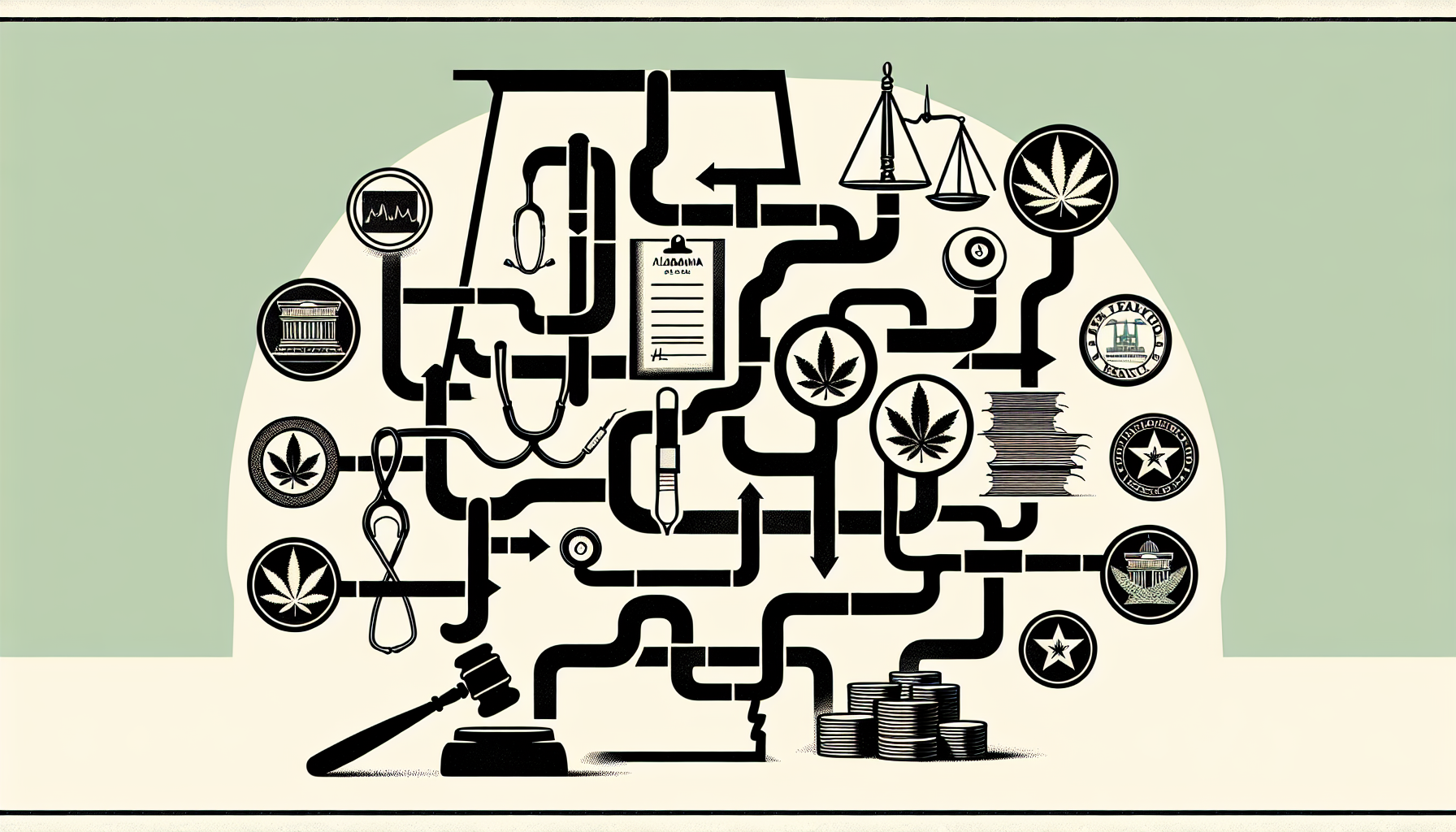Navigating Alabama Marijuana Legislation: Current Laws and Future Prospects
Welcome to a summary of Alabama marijuana legislation – a complex landscape of evolving laws, regulations, and reforms. From medical use to recreational use, from licensing procedures to legal consequences, Alabama’s approach to marijuana is multifaceted and ever-changing. Sit back and buckle up as we guide you through the labyrinth of Alabama marijuana laws, the role of the Alabama Medical Cannabis Commission (AMCC), the journey to award medical marijuana licenses, the current status and potential changes of recreational marijuana, and more.
Key Takeaways
- Alabama’s marijuana laws are complex and restrict recreational use, but medical cannabis will be legally accessible for registered patients.
- The Alabama Medical Cannabis Commission (AMCC) oversees the state’s program with regulations on consumption form and dosage.
- The Alabama medical marijuana program is expected to start in early 2024, with approved doctors and legalized dispensaries.
- Recreational marijuana remains illegal in Alabama, though prospects exist for legalization in the future due to federal legislation introduced in 2022.
Understanding Alabama’s Marijuana Landscape

In Alabama, medical marijuana will be accessible to patients who have been officially registered. The use of recreational cannabis has not yet received the go-ahead from lawmakers in this state. Consequently, certain regulations and restrictions on how medical marijuana can be consumed by registered users will be enforced – such as edibles or smokeable products having limitations imposed upon them by those managing legalities within the Alabaman law system.
Alabama Medical Cannabis Commission (AMCC)
The Alabama Medical Cannabis Commission (AMCC) is the regulatory body in charge of overseeing and enforcing state medical marijuana regulations. This process includes AMCC members such as Drs Saliski Jr, Blakemore, Gamble & Martin that have established a rigorous license application procedure for businesses associated with this program. The commission also works to guarantee safe access to cannabis products by eligible patients and uphold penalties against any violations up to felony punishable offenses. It ensures that all companies engaged in Alabamian medical cannabis abide by relevant laws so they avoid severe punishments.
Legalize Medical Marijuana
The process of legalizing medical marijuana in the state of Alabama was quite long and required an immense effort by lawmakers. After a lot of apprehension and discussion, the law for Medical Cannabis Legislation (known as The Darren Wesley ‘Ato’ Hall Compassion Act) got finally passed during May 2021 to permit usage legally for those with specific medical conditions. This move towards legalization brought forth multiple benefits such as providing relief to suffering patients while creating economic opportunities. It provided a natural option over pharmaceuticals, thereby reducing opioid dependence across states.
Alabama’s Medical Marijuana Program

In Alabama, an expansive medical marijuana program has been put into place post legalization. Patients can gain access to different types of medicinal cannabis products with some exceptions such as smokeable flower, paraphernalia used for consuming it like hash and concentrates. Sales of this plant-based medication are forecasted to start in late 2023 or early 2024 but only for AMCC approved patients who possess a physician’s prescription.
The current legal restrictions on the use of these drugs still stand though. No smoking or vaping is permitted under any circumstance, even if the patient receives up to 75 milligrams per day due to having diagnosed terminal illness. The Compassion. Act also requires pain sufferers to try alternatives first before being able to utilize weed. There are expected to be stringent regulations regarding doctor training.
Accessing Medical Cannabis
In Alabama, patients who wish to use medical cannabis must meet certain prerequisites laid out by Section 20-2A-3 (21) of the state code. To acquire a marijuana card, they need to be approved and certified by an authorized physician before beginning their registration statewide. Marijuana can be consumed in various formats: oils, creams, gels. Capsules/tablets. Tinctures or patches. Eating edibles as well as inhaling smoke or vaping are strictly prohibited under the law’s restrictions for regulated medicinal usage.
Caregivers and Medical Cannabis
Caregivers form a pivotal component of Alabama’s medical marijuana program. Those wishing to become caregivers must meet certain criteria which include living in the state, being at least 21 years old and possessing an AMCC-issued medical cannabis card as well as acting on behalf of their patient’s parent or legal guardian. They are required to complete a four hour course before getting certified for this role.
What is unique about Alabama’s approach to medicinal marijuana use is that multiple patients can be assisted by one caregiver – emphasizing its inclusive nature when it comes to administering such services. This highlights how beneficial the law has been able not just for individual users but also those who have adopted roles within the wider framework of protecting them from potential harm associated with usage abuse.
The Journey to Award Medical Marijuana Licenses

The process for granting medical cannabis licenses in the state of Alabama has been challenging, with many obstacles and lengthy delays. The first set was only granted on June 12th 2023 by the AMCC, while other remaining licenses are still being looked at carefully. As recently as November 2023, we saw two additional integrated suppliers awarded licenses to grow and distribute cannabis.
This significant delay in finally issuing all requested marijuana licenses is hindering progress in regards to the statewide medical cannabis program – as it had received over 600 applications already by December 2022 – highlighting how great demand there is within this industry.
Licensing Process Challenges
The state of Alabama has encountered various problems while awarding licenses to medical marijuana businesses. These issues comprise a lack of transparency, delays in approval times, valid objections raised and necessities for meeting cannabis legislation conditions. Typically, after approximately one month from the award date, following payments made and prerequisites checked by The Alabama Medical Cannabis Commission (AMCC), accepted permits are then issued out. In an effort to eradicate these challenges whilst enabling a faster procedure, the AMCC introduced emergency directives that aimed at authorising all licensees before 2021 concludes. Thus permitting earlier access throughout 2020-2021.
Licensed Dispensaries
The selection process followed by the AMCC when granting licenses to marijuana dispensaries in Alabama is rigorous and includes various requirements such as certification from participating physicians, meeting economic interest restrictions, and fulfilling strict legal obligations. Only a maximum of 37 dispensary licenses can be issued under this system. At present, CCS of Alabama, GP6 Wellness, Capitol Medical and RJK Holdings hold these coveted medical marijuana permits within the state boundaries despite stringent regulations imposed on them during the awarding procedure.
Recreational Marijuana in Alabama: Current Status and Potential Changes

At the current time, recreational marijuana remains illegal in Alabama. There has been much progress made on cannabis reform thanks to HB13, which authorizes towns and cities to employ a ‘Cite and Release’ tactic for minor violations such as possession of cannabis for personal use. Possession of too much cannabis carries serious consequences with it being seen as a Class B felony with prison terms up to 2-20 years long plus fines that can reach $30k max. Although this doesn’t end any possibility of imprisonment after conviction, it does give those found guilty an opportunity at simply receiving a citation instead of going through a detention pre-trial period.
Penalties for Possession and Cultivation
In Alabama, the penalties for possession and cultivation of recreational marijuana are serious. The maximum sentence for a Class A Misdemeanor related to personal use is up to 1 year in jail plus a $6,000 fine. For THC concentrates and hashish it increases. With punishment classified as a Class D felony potentially resulting in 1-5 years imprisonment. When accused of possessing marijuana beyond personal use or items associated with it, then this becomes punishable by law as a Class C felony that can land one into prison from 1-10 years accompanied by fines maxing out at $15K. Those facing these charges may be able to take advantage of available legal options such as finding counsel from knowledgeable drug defense attorneys who could lessen (or drop) charges on behalf of pretrial diversion programs offered via prosecution office(s).
Prospects for Legalization
Marijuana possession, cultivation and other related activities remain illegal in Alabama for recreational use. Though Republican House Speaker Nathaniel Ledbetter opposes the legalization of recreational marijuana, bills are still being proposed indicating an ongoing discussion surrounding its usage. If legalized, it can bring beneficial changes to tax revenues and criminal justice expenses while also providing medical aid towards conditions like nausea but with possible drawbacks such as adverse health effects or exacerbation of mental health issues. Regulations could be established regarding licensing protocols for production/distribution, age limits on consumption and measures to address driving under the influence. Workplace policies may change too.
Cannabis History in Alabama
In Alabama, the prohibition of cannabis dates back to 1931 when commissioner Harry J. Anslinger of the Federal Bureau of Narcotics spearheaded it. But this state has made considerable strides in its medical marijuana legislation journey by enacting Carly’s Law in 2014 and Leni’s Law in 2015. Two years after that, a law permits use of low-THC CBD oil for those with severe ailments. Minors suffering from epilepsy can legally employ cannabidiol or CBD oil thanks to earlier mentioned Carly’s law passed four years ago specifically designed for them.
Federal Marijuana Legislation and Its Impact on Alabama
In April 2022, the U.S. Representatives passed a notable bill to the Senate Judiciary Committee entitled The Marijuana Opportunity, Reinvestment and Expungement (MORE) Act that is designed to tackle decriminalization of marijuana and remedy challenges faced by those in cannabis businesses such as access to finances services and uniform federal regulation amidst high taxes. If approved in Congress, it could drastically impact Alabama’s possession laws concerning marijuana use across America. Another significant piece of legislation proposed was put forward July 2021 known as the Cannabis Administration And Opportunities Bill. This intends on introducing taxes for state legalization within certain regulations making allowances without any additional repercussions from Federal government officials. This law would be pivotal to changing how people view legalizing weed at an international level, potentially sparking landmark effects upon all states including Alabama if made into reality, positively or negatively depending on opinion.
Summary
When it comes to understanding the complex legal landscape of cannabis in Alabama, there’s a lot that must be taken into account. This includes understanding what role the state’s Medical Cannabis Commission has, how medical marijuana is being legalized here, difficulties when awarding licenses and whether recreational use is allowed or not under current legislation as well as federally mandated regulations. All these elements together are continuing to shape Alabama’s progressive approach toward marijuana usage despite potential challenges along the way – which reflects growing acceptance for this drug across America too.
Anyone wishing to partake in any aspect related to marijuana here should stay informed on relevant laws so they can successfully navigate through this ever-evolving terrain. Patients seeking relief from symptoms need licenses just as much as prospective business owners do! Clearly then, the conversation around cannabis regulation isn’t slowing down anytime soon within Alabama walls.
Frequently Asked Questions
Does Alabama have any marijuana dispensaries?
Marijuana dispensaries are not available in Alabama yet. Licensed dispensaries are expected to open in early 2024.
Can I get a marijuana card in Alabama?
In Alabama, a medical marijuana program is set to be launched. Those meeting the criteria as qualifying patients or their caregivers can receive registry identification cards for accessing cannabis-based medicine legally. This card costs $50. An alternative way of registering and receiving certification is getting virtual medical marijuana cards, which are priced at $40.
Is recreational marijuana legal in Tennessee?
In Tennessee, possessing marijuana (up to a half-ounce) is considered a misdemeanor and may be punishable with up to one year in jail as well as the highest possible fine of $2,500. Recreational use of cannabis is unfortunately not allowed in Tennessee.
What’s the current legal status of marijuana in Alabama?
Registered patients in Alabama are legally able to obtain medical marijuana once they have a medical card, though its recreational use is still outlawed. Patients must meet certain criteria laid out by the state when seeking treatment.
What is the role of the Alabama Medical Cannabis Commission?
The Alabama Medical Cannabis Commission has been assigned the job of managing and regulating medical marijuana within the state, including granting licenses to dispensaries as well as ensuring that all rules are followed. The commission’s role is essential for sustaining an effective system in regards to cannabis-related issues like medicinal use.

What are Qualifying Conditions for an Alabama Medical Card?
Medical Marijuana Conditions for Alabama are as follows.
To become a patient eligible for CBD under Leni’s Law, the patient must receive a diagnosis for a serious condition that is resistant to conventional medicine from a physician with whom they have a bona-fide physician-patient relationship and the CBD must be likely to provide the patient with therapeutic or palliative relief.
Carly’s Law previously required participation in a University of Alabama clinical trial to become a legal patient.
Eligible conditions
The affirmative defense is available if CBD would likely provide the patient with therapeutic or palliative relief to a number of conditions including:
- cachexia
- wasting syndrome;
- severe or chronic pain;
- severe nausea; seizures;
- severe and persistent muscle spasms.
- There is additionally a catchall to include any other condition that is severe and resistant to conventional medicine as an eligible condition.
Connect with our MMJ Doctors in Alabama
We’ll have a growing roster of Doctors who can prescribe cannabis all over Alabama, CalmEffect is ready to help. Learn about how you can get your medical card in Alabama by filling out the form on this page.
More info on cannabis in Alabama?
Find a list of conditions that qualify for marijuana in Alabama
Find an Alabama dispensary near you!
Dispensary deals and Dispensary locations in Alabama have been updated.
Schedule an Alabama medical marijuana appointment Click Here

